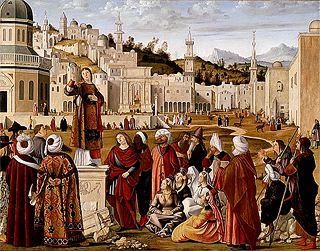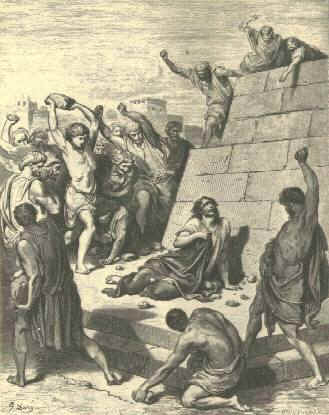
(Matthew 16:13-23)
May these words of this Peter be like a rock,
not a stumbling block!
|
|
"Who do you say
that I am?" Jesus asked. Simon Peter answered, "You
are the Messiah, the Son of the living God." And Jesus
answered, "Blessed are you, Simon son of Jonah! ... You are
Peter (petros), and on this rock (petra)
I will build my church..." Jesus then began to speak of
the rough road ahead. And Peter took him aside and rebuked him... "Get
behind me, Satan!" Jesus replied. "You are a stumbling
block..." (Matthew 16:13-23) May these words of this Peter be like a rock, |
"Gazing into heaven"
Message preached April 28, 2002
Long Green Valley Church of the Brethren
Glen Arm, Maryland USA
based upon Acts
7:55-60 (see notes
on 7:54-8:3)
Youíve
seen those television commercials for the new wonder drugs now on the market,
havenít you? The people in 
 them
look so appealing, like they are enjoying life to the fu
them
look so appealing, like they are enjoying life to the fu llest.
Youíd never guess that before this pill came along, theyíd been suffering
from some dysfunction/disorder/disease ... whatever. Almost makes you wish you
had that malady so you could go out and get this amazing medicine so you could
become just like them.
llest.
Youíd never guess that before this pill came along, theyíd been suffering
from some dysfunction/disorder/disease ... whatever. Almost makes you wish you
had that malady so you could go out and get this amazing medicine so you could
become just like them.
 And then, with all this sunshine and smiles and upbeat music in the background,
the announcer quickly runs through some of the possible side-effects of this new
wonder drug - perhaps hoping that we donít really pay attention. All of a
sudden, if you do listen, you start wondering if the cure isnít worse than the
disease. Reading the fine print is important.
And then, with all this sunshine and smiles and upbeat music in the background,
the announcer quickly runs through some of the possible side-effects of this new
wonder drug - perhaps hoping that we donít really pay attention. All of a
sudden, if you do listen, you start wondering if the cure isnít worse than the
disease. Reading the fine print is important.
In the church year, we are currently walking through the season of Easter. In how many ways can we tell the wonderful story of resurrection? How often can we share about this abundant life available to us in Christ Jesus? How many times can we share that fresh starts are always possible in the Lord - each and every day? The message of Easter cannot be contained in a single day of the year, or even a season, can it? Countless are the ways, the opportunities, the times for simply telling the good news.
Of course, as we tell this news we need to be honest and up front with people about the possible side effects of a closer walk with God in Christ Jesus. No, the "cure" isn't worse than the "disease" ... but becoming a disciple is not just "sunshine and smiles and upbeat music." We have no better authority on this than the story as it told in the Bible. When someone is hungry for God, we point them to this book of books and encourage them to "eat." However, you know, this book does not sugar coat anything. Thatís certainly true of this morningís scripture passage from the book of Acts.
Here was a fellow with a bright future. His name was Stephen. Itís only in the preceding chapter of Acts that we become acquainted with this man, when he along with several others were called by the early church to the new task of being deacons (Acts 6:1-7). This role was originally envisioned as one of caregiving, e.g. making sure that nobody would be left out in the daily distribution of food.
 After being called out, however, Stephen started sharing a different kind of
bread. You could say he had the gift of gab. He apparently was a good speaker.
In fact, as a preacher he was second only to the apostle Peter. Literally. The
book of Acts records some of the initial sermons preached in the early church,
and a message from Stephen is the second one recorded in these pages. Of course,
wouldnít you know it - by opening his mouth, Stephen got himself in trouble.
To be honest, thatís a "side-effect" of becoming a Christian -
something we need to be clear about. Following Jesus can be risky business.
After being called out, however, Stephen started sharing a different kind of
bread. You could say he had the gift of gab. He apparently was a good speaker.
In fact, as a preacher he was second only to the apostle Peter. Literally. The
book of Acts records some of the initial sermons preached in the early church,
and a message from Stephen is the second one recorded in these pages. Of course,
wouldnít you know it - by opening his mouth, Stephen got himself in trouble.
To be honest, thatís a "side-effect" of becoming a Christian -
something we need to be clear about. Following Jesus can be risky business.
Thatís why our forebearers in the faith emphasized that baptism is for those who are aware of the cost of being a disciple, of the potential side-effects. Itís not that our salvation isnít offered to us freely. We donít have to pay anything. Jesus handled that upon the cross. "Paid in full," the receipt says. However, once we receive what God so freely gives, and the Lord works his grace and peace, his justice and righteousness into our lives, the living out of this salvation, working out into how we live what God works in (see Philippians 2:12-13), e.g. bearing fruit, is not always "peaches and cream." Yes, as that song says, "every day with Jesus is sweeter than the day before," but thatís not the whole story. Just ask Stephen.
This deacon was, as scripture says, "full of grace and power," and he "did great wonders and signs among the people" (Acts 6:8). Now, it doesnít say what those "wonders and signs" were, but I take it they were more than just passing around a loaf of bread. Some folks were a bit suspicious of this Stephen and they started raising questions about him, eventually stirring up a hornetís nest of trouble.
Let me pause for a minute and say something that needs to be said whenever we approach passages like this. The boundary between the first believers, the early church of Christ, and the Jewish faith, the synagogue was not all that clear. In the beginning, those who followed Jesus saw themselves as Jews - just like the one they followed. Jesus was a Jew. We need to say that. As the years went by, a separation grew between the synagogue and the church, until they became distinct from one another. But in the beginning there was no clear line of demarcation. Eventually, however, the separation occurred - and one of the by-products (unfortunately) on our side of the divide was what we call "anti-Semitism."
 On Tuesday, Iíll be heading as a chaperone with my daughterís history class
to the Holocaust museum in
Washington D.C. The teacher, by the way, sent home a book for me and the other
parents to read in preparation - the first time I ever had to do
"homework" to go with my child on a field trip. The book, entitled
"Never
to Forget," was a hard read. What happened to the Jews in World War II
needs to be remembered, as awful as it was. Most difficult was to read of the
roots of anti-Semitism in the church of Jesus Christ, who was himself a Jew.
On Tuesday, Iíll be heading as a chaperone with my daughterís history class
to the Holocaust museum in
Washington D.C. The teacher, by the way, sent home a book for me and the other
parents to read in preparation - the first time I ever had to do
"homework" to go with my child on a field trip. The book, entitled
"Never
to Forget," was a hard read. What happened to the Jews in World War II
needs to be remembered, as awful as it was. Most difficult was to read of the
roots of anti-Semitism in the church of Jesus Christ, who was himself a Jew.
In this story of Stephen, we encounter one of those roots - not necessarily in what is said, but in what was done with this story by later generations. Letís be clear, folks, our faith doesnít say that it was the Jews who killed Jesus, or even the Jews who killed Stephen. As we seek to embed in our awareness during the season of Lent every year, it was you and I. No, we didnít literally pound the nails into Jesusí hands and feet. No, we didnít literally throw the stone at Stephen. But that part of each one of us that bears the seed of inhumanity, of violence, of sin against God and neighbor, is guilty. Itís not "somebody else." Itís us! Are we clear about that?
Okay, letís proceed. Stephen was a darn good deacon, and we objected. Something good was happening and it wasnít to our liking, and so we called him on the carpet. We spread rumors about him. Now, I imagine we had good motives. Itís important, after all, that we preserve the faith - making sure that people donít just trample all over it, persons like this Stephen character. What on earth is a "deacon," anyway? Next theyíll be trying to bring non-Brethren folks into the fold without making sure that they become fully "Brethren." ... Oops, I think I just overstepped the story as weíve received it. But I think you know what I mean.
Stephen was called before the high council to explain himself. It says that when he was standing in front of all those people, "his face was like the face of an angel" (Acts 6:15). Which makes sense - because an angel is a "messenger" of God, and Stephen had a message to tell. Thatís just what he did - his first and, as it turned out, his last sermon. Now, I wonít repeat it. Youíll find what he said in the first 53 verses of Acts chapter 7. He basically retold the story of the Bible, from Abraham through the prophets. Friends, there was nothing in that sermon that a good Jew couldnít say "Amen" to, nothing that they hadnít already heard. He ended on a harsh note, but so did every prophet God ever sent. Of course, those who heard him knew he was talking about how they were now rejecting Jesus, even though he never once spoke that name in his first and last sermon. (Imagine preaching a "Christian" sermon without mentioning Jesus!)
Now, when we
(Iím trying to be consistent here, folks) heard what Stephen said, we got mad
and ground our teeth. And then this promising young whippersnapper "gazed
into heaven" and saw something we couldnít see - apparently. "Look,"
he said, "I see the heavens opened and the Son of Man standing at the
right hand of God!" (Acts 7:56) Again, he doesnít
 mention
Jesus by name, but those who hear know thatís who he is talking about. This is
the dividing line between Jew and Christian, my friends. To claim that this dead
rabbi, even if we admit he was a very good and wise rabbi, even if his followers
claim he is not dead but alive, to claim that this person is the "Son of
Man standing at the right hand of God" is blasphemy. Itís going too
far.
mention
Jesus by name, but those who hear know thatís who he is talking about. This is
the dividing line between Jew and Christian, my friends. To claim that this dead
rabbi, even if we admit he was a very good and wise rabbi, even if his followers
claim he is not dead but alive, to claim that this person is the "Son of
Man standing at the right hand of God" is blasphemy. Itís going too
far.
And so we covered our ears and violently shut the mouth which spoke those words. Now, Iím not going to go into the whyís and whereforeís of what those people did in putting Stephen to death. Stoning, like crucifixion, was a terrible way to die. And there was some backing for it in the Bible (see Deuteronomy 17:2-7) and the Mishnah (see Sanhedrin 6:1-4), though what happened to Stephen was not exactly done in the proper way. The point, however, is that being a disciple is risky business. One of the side-effects for Stephen, like for many followers of Jesus down through the centuries, is persecution. And persecution is something our Jewish brothers and sisters understand too well. Maybe we should, also.
What a way to lead into a baptism! But itís a reality we need to have before us whenever we step out by faith. This faith may lead us into dangerous territory. Are you still interested? Would you grab your hymnal just now and turn to # 437. Iíd like you to read out loud with me something one of our Brethren forebearers said about becoming a disciple of Jesus. His name was Alexander Mack, but his name is not important. What matters is the One whom we see when we "gaze into heaven." Letís read:
"Count well the cost," Christ Jesus says, "when
you lay the foundation.
"Are you resolved, though all seem lost, to risk your reputation,
your self, your wealth, for Christ the Lord as you now give your solemn word?
Into Christ's death be buried now through baptism's joyous
union.
No claim of self dare you allow if you desire communion
with Christ's true church, his willing bride, which, through his word, he has
supplied.
Within the church's warm embrace the child of God is molded.
God's Spirit lights the infant face and in God's grace is folded.
With childlike steps, Christ's plan we trace, till we grow up in godly grace.
In Christian growth we are matured, of fruitful vines a token.
That this good growth may be assured ofttimes to us is broken
the bread of fellowship replete when Christ's redeemed together meet.
Yes, "every day with Jesus is sweeter than the day before." Yes, "every morning is Easter morning from now on." When we present the "commercial" of our daily life in Christ (we may be, after all, the only Bible some people will ever read), what needs to be seen is not a sober and somber people, but rather folks who are filled with the joy of the Lord. However, we also need to be clear about the "side-effects" of being a disciple. The good new is that even these potential "side effects" have a larger purpose. That's true in this morning's scripture.
You see, there is a postscript to this story of Stephen. Those who killed him took off their coats before grabbing and tossing their stones, and laid them at the feet of another promising young man. This fellow went on to try to wipe out this Christian movement. He did so, that is, until the truth behind Stephenís sermon smacked him right between the eyes on the road to Damascus. This young man, himself a Jew - a Pharisee, became the apostle Paul. But his is another story for another time.
For commentaries consulted, see Acts.
©2002 Peter L. Haynes